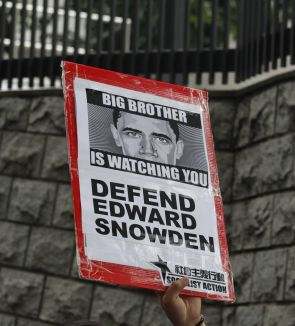 | « Back to article | Print this article |
 Any attempt by the Indian authorities to protest against extensive surveillance on Indians by the US will be hamstrung by what the authorities themselves are up to, notes Subir Roy.
Any attempt by the Indian authorities to protest against extensive surveillance on Indians by the US will be hamstrung by what the authorities themselves are up to, notes Subir Roy.
The United States will have to engage for a long time in limiting the damage caused by Edward Snowden’s revelations that the American authorities have been snooping not just on the country’s own citizens but across the world. Currently, there is outrage in Europe over the extensive snooping on Europeans at both Brussels and Washington.
But any attempt by the Indian authorities to protest against extensive surveillance on Indians -- India is reportedly placed fifth in the global list of countries monitored by the US -- will be hamstrung by what the authorities themselves are up to. So the real task of fighting for privacy will have to be undertaken by Indians at the individual level. They will have to track the debate in the US provoked by Snowden and ask what kind of system they have to live with, and whether it is in consonance with the pride taken in being a large functioning democracy that protects individual rights.
Snowden has revealed how the US National Security Agency collected logs of nearly every phone call Americans made and, with the help of its ever-obliging British counterparts, tapped into the continent’s major fibre-optic communication cables. In its spying programme, the NSA went beyond terrorism, targeting foreigners of any conceivable interest. It built a target list of computer hard drives and phone systems that America’s leaders in a future conflict might want to wipe out.
What made Snowden act? In the mature words of the 30-year-old: “I can’t in good conscience allow the US government to destroy privacy, internet freedom and basic liberties for people around the world with this massive surveillance machine they are secretly building.”
The US’ democracy, famed for its checks and balances to protect civil liberty, has changed much since 9/11; sweeping powers have been given to the administration under the Patriot Act. Mr Snowden became a whistle-blower at great personal cost -- he risked being called a traitor -- to protect what the US constitution guarantees. The extreme step he eventually took was motivated in part by disappointment over Barack Obama’s presidency.
With all this happening in the US, India is busy rolling out its centralised monitoring system, which will create a huge surveillance machinery. The game plan seems to be to intercept in real time all voice and data traffic within India and also going in and out. This whole exercise will have no statutory sanction, no supervisory authority and no scope for redress. In the US, the NSA needed an order from a court, no matter how obliging, to get Verizon data. In India, the government doesn’t need to go to court because it is empowered to ask for data under the telecom licences. Sections 69A and 69B of the Information Technology Act are pretty draconian.
When the Unique Identification Authority of India was created, its founder acknowledged the need for protection of privacy. But as yet there is no law to protect citizens from misuse of power and to safeguard their right to privacy. The commercial need for privacy and data protection arose when the future of the large Indian offshore services industry was threatened by clients seeking to shift to the Philippines, Vietnam and Israel. In response came the 2011 “privacy rules”. A panel headed by Justice A P Shah was constituted to examine the matter and a draft privacy Bill has reportedly been prepared with proper supervised surveillance; it is yet to be made public.
Experts feel that blanket surveillance (for example, all phone calls and emails) is dangerous and unproductive. It creates a haystack in which it is difficult to find the needle. Algorithms using key words to depict patterns and identify targets effectively require high information technology skills. Instead, what is needed is selective surveillance, which is properly authorised. Above all, there is a need to balance security and freedom. As things stand, officials are given a free hand in devising gargantuan systems with the latest technology without any thought of protecting freedoms.
But the legal framework will not be handed over on a platter by a benevolent system. Individuals have to fight for it by taking great personal risk and become whistle-blowers like Mr Snowden. India’s record in protecting whistle-blowers is miserable. An engineer complaining about corruption in building highways was killed; an official acting against adulteration of subsidised fuel met the same fate; an expert complaining against false certification by a drug firm first resigned, then spilled the beans in the US and eventually secured damages. India’s company law has no provision that mandates firms to create a system to listen to and protect whistle-blowers.
Roger Cohen, writing in The New York Times, has said that history will judge Mr Snowden “kindly”. He is currently being called a traitor. What will history say about Indians?
Image: A supporter of Edward Snowden protests in Hong Kong
Photograph: Bobby Yip/Reuters